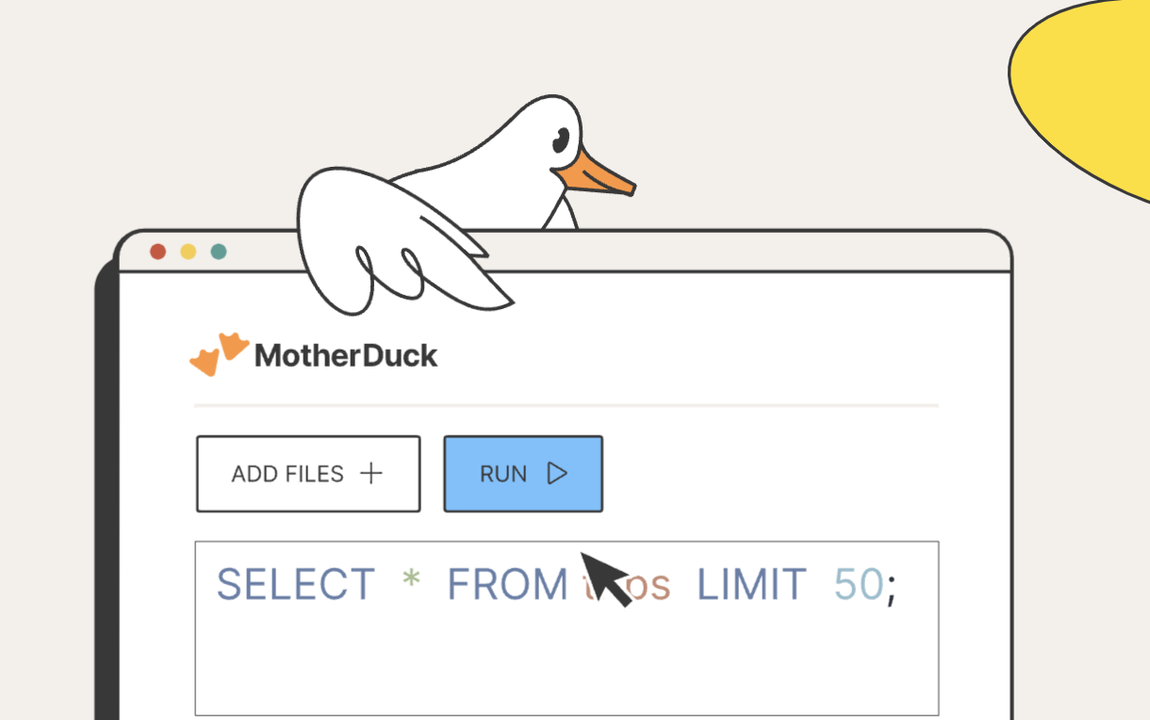A few weeks ago, it was reported that MotherDuck, the company commercializing the lightweight database platform DuckDB, was in talks to raise new capital from VC firm Felicis.
Those talks went well, apparently.
MotherDuck today announced that it landed $52.5 million in a Series B round led by Felicis with participation from a16z, Madrona, Amplify Partners, Altimeter, Redpoint and Zero Prime, bringing the startup’s total raised to $100 million.
The tranche values MotherDuck at $400 million post-money, and will be put toward expanding MotherDuck’s engineering and go-to-market teams, CEO Jordan Tigani tells me. Tigani expects MotherDuck’s headcount to grow from 32 staffers currently to 45 by the end of the year.
“Since we launched in mid-June, we’ve taken feedback from hundreds of users and quickly iterated to improve [performance],” Tigani said in an email interview.
Tigani, the former engineering director at database startup SingleStore and a founding engineer at BigQuery, Google’s fully managed big data analytics service, was inspired to found MotherDuck after observing that the majority of companies’ database workloads were on the smaller side — between 1GB and 10GB. While database vendors were building for massive datasets, recent advances in hardware were making working with those datasets more efficient.
“Distributed database technologies became very popular starting in the early 2000s, as the hardware at the time wasn’t capable of doing transformations and queries on normal size data without distributing the execution,” Tigani said. “Hardware has advanced a lot over the last roughly 17 years, yet we still view distributed compute as the solution for all these scaling challenges.”
So Tigani reached out to Hannes Mühleisen, a co-creator of DuckDB, to see if the DuckDB team had any plans to productize the platform. (Tigani had been a longtime follower of DuckDB, which he believed to be among the more performant open source database projects.) As it turns out, they didn’t — but they were willing to work with Tigani to bring DuckDB to the cloud.
“With that, the idea for MotherDuck was born,” Tigani said. “MotherDuck would bring together the elegance and speed of DuckDB together with collaboration and scalability of the cloud. And the DuckDB creators would be able to continue to focus their efforts on the independent innovation of the core platform.”
The adoption of open source databases continues to grow. According to a recent survey from Percona, nearly 90% of IT organizations already use two open source databases or more. Meanwhile, the number of database software options has exploded (see: PostgreSQL, MongoDB and MySQL), and a plethora of companies — including DuckDB, it would appear — have successfully built businesses around managing popular open source database solutions for their customers.
MotherDuck provides a cloud analytics service based on DuckDB. It can be used to build software-as-a-service apps with analytics capabilities, as a data warehouse (i.e. a system for reporting and data analysis) or as a query engine for a data lake (i.e. a centralized repository for storing data).

“DuckDB takes a simplified scale-up approach to scaling, allowing us and the DuckDB team to focus on improving usability,” Tigani said. “We see MotherDuck increasingly used in place of Python or other local analytics tools for teams’ power and simplicity.”
That may be so. But there are many, many startups doing what MotherDuck’s done — taking a popular open source database engine and putting it on the cloud, charging a subscription for value-added services and abstracting away maintenance.
So why would a company choose MotherDuck versus the others out there? Chiefly performance, cost and flexibility, Tigani asserts. DuckDB can run and query data from nearly anywhere, including a web browser, and generally executes analytical queries faster than alternatives like PostgreSQL. That leads to decreased compute spend for a fair number of organizations, Tigani says.
“Using transactional databases, such as Postgres, for analytics means suffering reduced performance at higher costs versus using analytical databases,” he said. “Simpler is often better — for the 95% of us who do not have petabyte-scale data, a scale-up approach to analytics based on an engine like DuckDB can be faster, cheaper and more user-friendly than distributed architectures.”
MotherDuck — which claims to have nearly 2,000 users, including companies like ATM.com — removed the waitlist for its platform this morning. On the near-term product roadmap is an improved programming notebook experience with auto-complete, faster data import and improved database sharing, as well as bringing the upcoming release of DuckDB, DuckDB 0.9.0, to the MotherDuck platform.































Comment